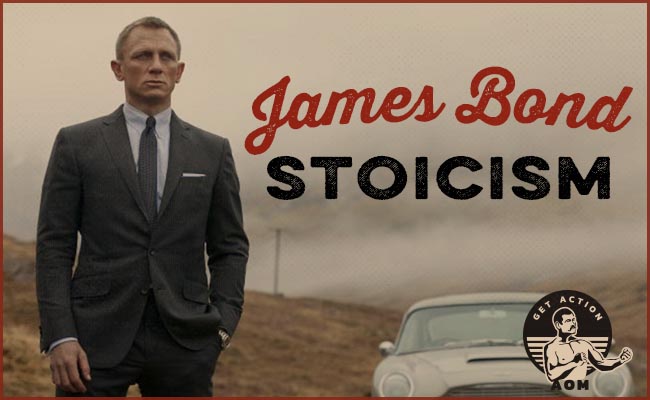
One of the things that makes the James Bond books better than the James Bond films, is that while the latter mostly represent not-too-deep action-driven entertainment, the former are peppered with philosophical asides. Ian Fleming’s 007 has arguments with his nemeses on the nature of power and autonomy and discussions with colleagues as to how one can know if they’re really on the right side of things.
Bond himself lives with a certain personal philosophy, one that mixes different elements, including Epicureanism and existentialism. Its strongest streak, however, is that of Stoicism. Which certainly makes sense: the life of a secret agent is full of uncertainties. Bond is never sure what to expect on his missions and must deal with a constantly changing landscape — both physically, in terms of unexpected dangers and obstacles, and psychologically, in the form of feeling out new rivals and colleagues and dealing with double-crossings. He is invariably captured by his enemies and must endure merciless torture without cracking under the pressure. And, of course, he is constantly faced with the prospect of death — the very real chance that he will not come through his next mission alive.
While the fictional Bond must grapple with unusually acute pressures, the Stoicism he adopts in response to them has something to teach all of us in our more ordinary real-world operations.
Concentrate on What You Can Control — Secure Your Base
Life’s variables can broadly be broken down into things over which we have control, and things over which we do not.
When it comes to the former category, Bond has his hand on the tiller of details and stacks each of them in his favor. As Fleming writes in Moonraker: “Whenever he had a job of work to do he would take infinite pains beforehand and leave as little as possible to chance.”
Bond ever looks to achieve “Clausewitz’s first principle” by making “his base secure.” Securing his base creates a personal “headquarters” that is well-defended against external disruptions. For Bond this means finding out as much information about the people and places in a case as possible, partnering with competent allies, making sure his equipment is in working order (e.g., repeatedly assembling and reassembling his gun), vigorously training in the specific skills which an operation will require (as well as learning a variety of other arts just in case they’re needed), and mentally visualizing beforehand exactly what moves he’ll make.
By planning and executing every controllable element to a T, Bond ensures he’s always operating from a position of greatest possible strength. As his antagonist in Dr. Noexplains, echoing 007’s own philosophy: “Mister Bond, power is sovereignty. Clausewitz’s first principle was to have a secure base. From there one proceeds to freedom of action.”
ccept What You Cannot Control — Including Your Own DeathOnce “There was nothing else he could do or insure against,” Bond would relax, accepting that “The rest was up to the Fates.”
Bond understands that no matter how much you magnify your individual agency, it’s impossible to plan for every exigency, nor influence every variable. He balances supreme confidence with realistic humility. At the same time, he understands that there is still an element of autonomy in dealing with
No comments:
Post a Comment